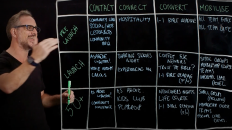The last couple of years have been interesting in terms of my job, my wider ministry and my personal life on lots of levels. Lots of new things have come into my life, and I’ve taken on new kinds of responsibilities: whether with more staff, or new book projects or organisational projects. I think I’ve made good decisions about what to say Yes to and what to say No to… but this has still led to having Too Much To Do.
When I anticipate having Too Much To Do, I do all the Right Things: writing out a full list of my goals, projects and next actions, analyse them using the Important/Unimportant—Urgent/Non-Urgent matrix, Do/Dump/Delegate/Defer, set realistic deadlines and schedule chunks of time (including regular time in my calendar. In fact, these last few years I’ve been more proactive that I have previously in setting aside some time on alternating weeks to work on different major projects/areas of responsibility (which has kind of worked, sort of, not really — I think it’s made space in my head for ‘it’s ok not to try to do a bit of everything every week, more than actually locking in an actual routine).
BUT the thing I’ve noticed… which is the thing this blog post is actually about: how what you think you have prioritised compared to what you actually end up prioritising.
What I’ve noticed, is:
1. Be smart about pre-planning certain key things
There are some things you need to be proactive and smart about when you’re too busy, or else they just won’t happen. Because some things are sufficiently hard to keep doing in the craziness of things, and are never especially a big priority. If these things do matter, then you have to be smart and plan ahead around them in a different way:
- any meetings that need to happen regularly or semi-regularly need to be booked in advance, preferably for the whole year. It’s easier to re-schedule and cancel some of them than to have to organise them as the year goes on.
- Any regular jobs that need delegating or parceling out need to be done in advance. It’s hard, again, to find the energy and motivation to do a string of minor delegations across the year. I am especially thinking here of ministry teams, where there might be 5–10 projects or events that need to be done. Divvy these up early.
But this is also true potentially for lots of other things: holidays is a big one, too. I guess it’s good to notice in a busy season what kind of smallish actions take a disproportionate amount of energy for you (others for me include booking doctor/dentist appointments and writing agendas/minutes) … and other delegate them out, or plan them in advance as much as possible.
2. Embrace fuzzy edges and minor failures
Having said that, in a busy season, when you are attempting more massive important things, then smaller but valuable things should suffer.
If, like me, you aspire to #inboxzero and being responsive to email and SMS requests and being reliable about deadlines (re-scheduling in advance if you won’t hit them) and being on top of meetings (even if 5–10 minutes late) and closely managing things delegated to others and generally remembering things… you have to also be comfortable to let this go a bit.
It’s ok to forget some stuff. It’s ok to accidentally double book or run hopelessly late sometimes. It’s ok to delegate something, not follow up on the delegation and have the thing not happen. It’s ok to manage your email and TODO list in survival mode. It’s ok to fail and ask for forgiveness.
The reality is LOTS AND LOTS of people and even entire ministries do things like this ALL THE TIME. That doesn’t make it good. But it does make it ok-ish. And normal. And fine. Things go on well enough. And most people’s expectations assumes that most other people are unreliable. So embrace that!
I still have found that experience seedy and stressful and unpleasant. I have tried to review and adjust my habits and patterns to avoid some of the worst of these things… but it is good to recognise that ‘perfect, well-oiled machine, mind-like-water’ is often the enemy of doing really important things.
And sometimes the things that you were going to do through diligence, get done by others through the initiative of others. Sometimes things you were doing to do in response to a note-to-self in your unemptied inbox, you do spontanteously through remembering about it in a quiet moment. Sometimes things just don’t end up happening and they weren’t that important anyway.
3. Let yourself discover your actual priorities
A final thing, that I kind of knew, but have definitely noticed afresh over the last few years, is that you end up not doing things that don’t matter to you. These might not be the things you rationally assessed to be the things you shouldn’t do. They are:
- the things that you Really Don’t Want To, which add a massive drain on your energy. Each of us have different things in this category. Often we have to exercise self-discipline and faithfulness and do these things anyway. But there’s a fair bit of wiggle room. And it’s ok to go with the way you a naturally wired to a certain extent. For me: administration and routine meetings fit into this category.
- The things that you deep down Know Don’t Really Matter. There’s lots of things for me that I value. I want to be the person who does these things. And I know they are things you just have to do regularly to make them worth doing. Blogging is like that. I’ve been blogging for over 10 years, and I rarely have gaps longer than a month. And blogging is not something I’m going to cut out of my life in my analysis of what I should stop doing in a busy season. But in practice, in the midst of the intensity, I intuitively know that no great problems are created by blogging less and not great outcomes are achieved by blogging more. So I intuitively have been blogging more like once a month the last 2 years rather than once a week. I hadn’t planned to do that.. .but it just happened.
All of this is the reason why the Manager Tools podcast rightly recommends delegating TOO much to other people is a great way to help those who work with you learn how to prioritise and also to discover what really doesn’t matter.



